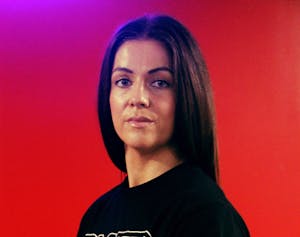
Last week, IOC president Thomas Bach reiterated his message that the Olympic Games will go ahead as planned in Tokyo this July. “The question is not ‘whether’, the question is ‘how’ these Olympic Games will take place,” he said.
As an athlete currently preparing for an Olympic qualification event in the sport of karate, I have mixed feelings around the prospect of this year’s Games. I am, along with many other athletes, delighted to have the opportunity to still pursue the Olympic dream. But I have a number of concerns that I do not feel have been adequately addressed by the IOC and other Tokyo Olympics stakeholders.
In March last year, the government in my country, Ireland, brought in warranted restrictions to protect public health and control the spread of Covid-19. Shortly afterwards, the IOC postponed the Tokyo 2020 Games to July and August 2021. For most athletes at that time, training for competition became next to impossible, as facilities shut and we stayed at home. A full year later, many of the world’s elite athletes have yet to gain access to adequate training facilities. Here in Ireland, gyms remain closed. However, our National Olympic Committee still expects athletes to be competition-ready and our government is happily supporting sending a team to the Olympic Games this summer.
This has left me questioning if it is fair to ask athletes, many of whom are unpaid, to represent their country at the highest level in their sport in the midst of a pandemic, without the support necessary to train safely in advance. Athletes have been left vulnerable to injury, illness and underperformance on the global stage.
In the past few months, numerous Olympic qualification events have been cancelled or postponed – badminton and gymnastics are two recent examples. My own sport has been no different, with another World Karate Federation Olympic qualification event being cancelled just last week. I fear that qualification criteria will soon shift to past performances and athletes who are yet to qualify will miss out. Perhaps this is just bad luck for those of us that get caught in this position. But I wonder if more could have been done to avoid it.
This is not to fault of the international federations, or the countries organising these events – I think every effort is being made to run the competitions, and public health must come first.
However, the Olympic Games are only four months away and many athletes, particularly those in indoor contact sports, have had no access to high quality competition for a year. And again, from an athlete’s point of view, it raises the question: is it worth taking part in a Games this summer – a moment you have been dedicating your life towards – when you have not been given access to safe, adequate and competitive preparation?
Many sports events have been delivered during the pandemic. The IOC president referenced more than 270 events that have been safely organised since September 2020. That is certainly something to be positive and hopeful about. But when we look across the 33 Olympic sports that are included in the Tokyo Games programme, and across different regions of the world, there is enormous inequity. Some sports and athletes have enviable access to high quality competition, while many others have not.
In my view, National Olympic Committees and International Federations have a duty to athletes to speak up on this issue and to ensure that as many athletes as possible are given a safe and fair pathway to Olympic competition. Ultimately, responsibility lies with the IOC to make sure that the Games they oversee and their qualification pathways are both athlete-centred and respectful of public health measures.
Last month, we were given the first draft of the Tokyo 2020 ‘Playbooks’ – the Games organisers’ plans to manage the Covid-19 risk. The IOC and the Tokyo organising committee have been handed an enormous task to deliver these Games safely, and more detailed plans are expected to be revealed in April. Having said that, the first draft is disappointing. Beyond the usual “wash your hands” and social distancing measures we are accustomed to, we have been given little insight into the safety measures we can expect during the Games. As an athlete I am left with more questions than answers. For example, how will thousands of athletes in the Athlete Village manage social distancing, especially when room-sharing? Will we be asked to sign Covid-19-related waivers that may leave us assuming health and economic risks from taking part in the Games? Are we potentially going to be responsible for putting the Japanese public at risk?
I appreciate the IOC has a tremendous amount to consider as it prepares for the postponed Games, and it is promising to protect the health and welfare of all stakeholders. But I feel the expectations being made of athletes, and in particular the access to fair qualification and preparation pathways, should have been given more consideration. Last year, Global Athlete called for meaningful athlete engagement with the Olympics to prepare for a postponed Games. That unfortunately did not come to fruition.
It is probably too late to address some of the concerns I’ve raised above about the Tokyo Olympics. But perhaps lessons can be learned for the future, and athletes and their representatives of choice will be given a stronger role in decision-making around major sports events.
Caradh O’Donovan is an Irish national team karate athlete, a radio presenter, a member of athletes’ representative body Global Athlete, and an ambassador for sports diversity charity Equity Sport.